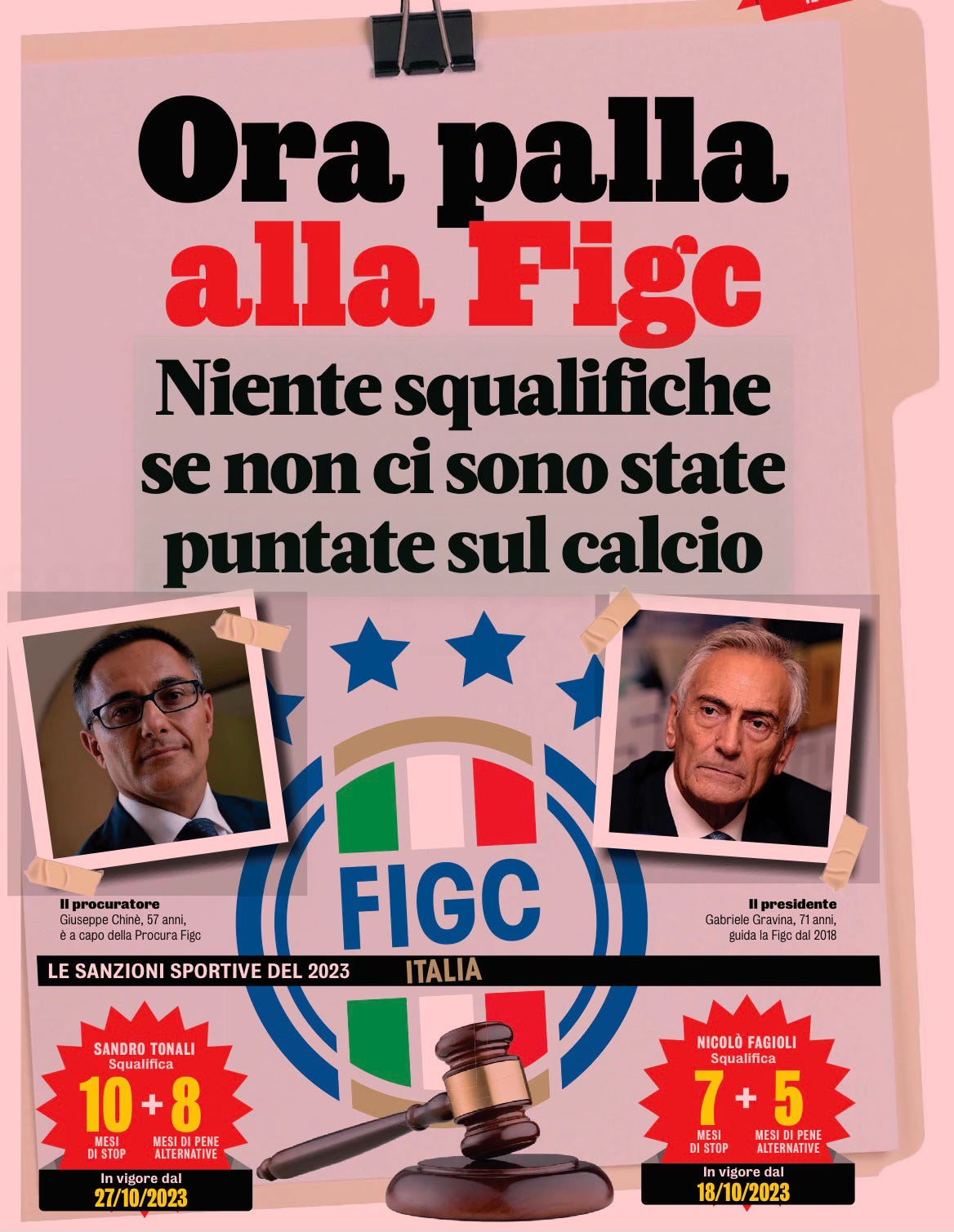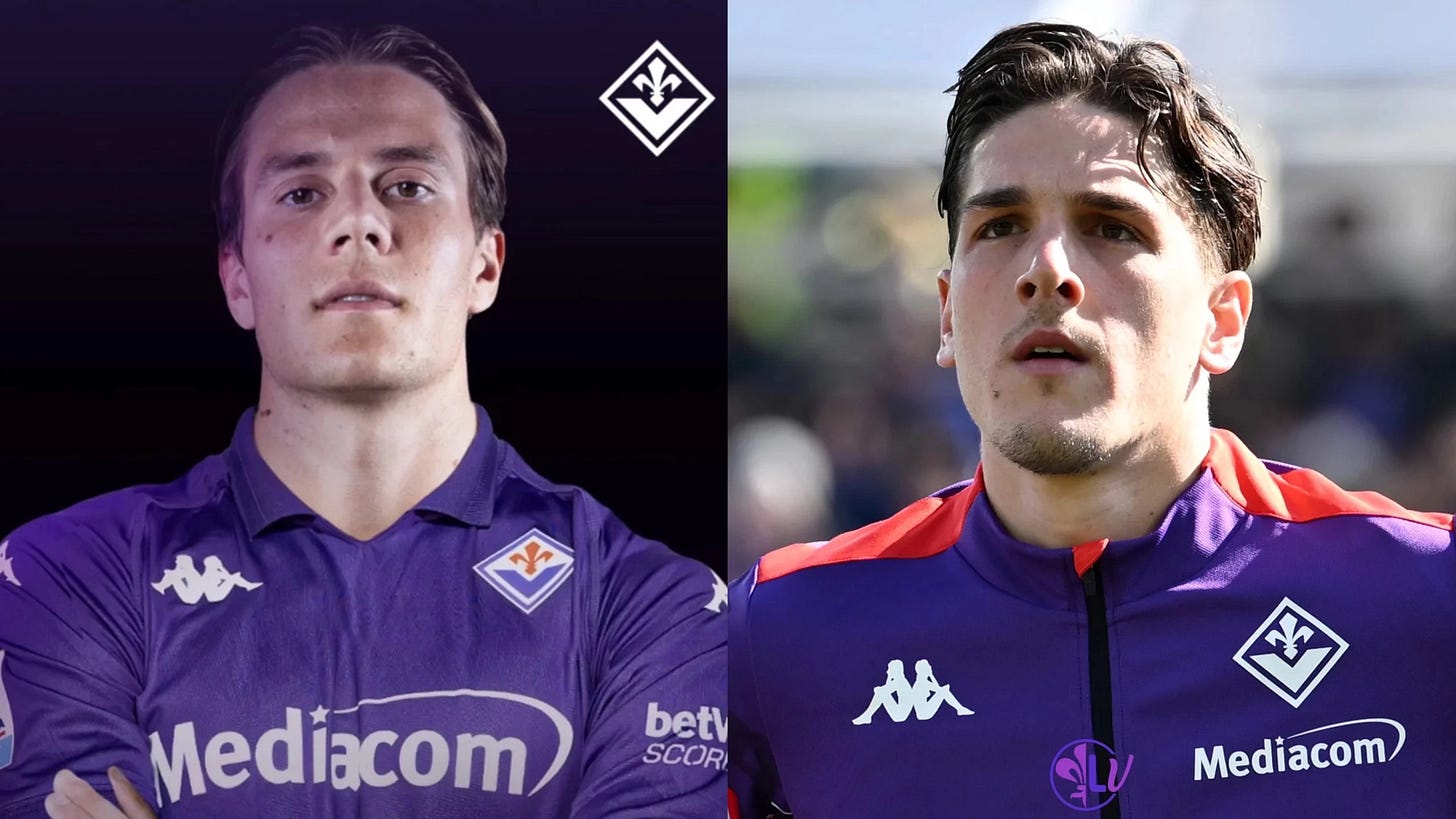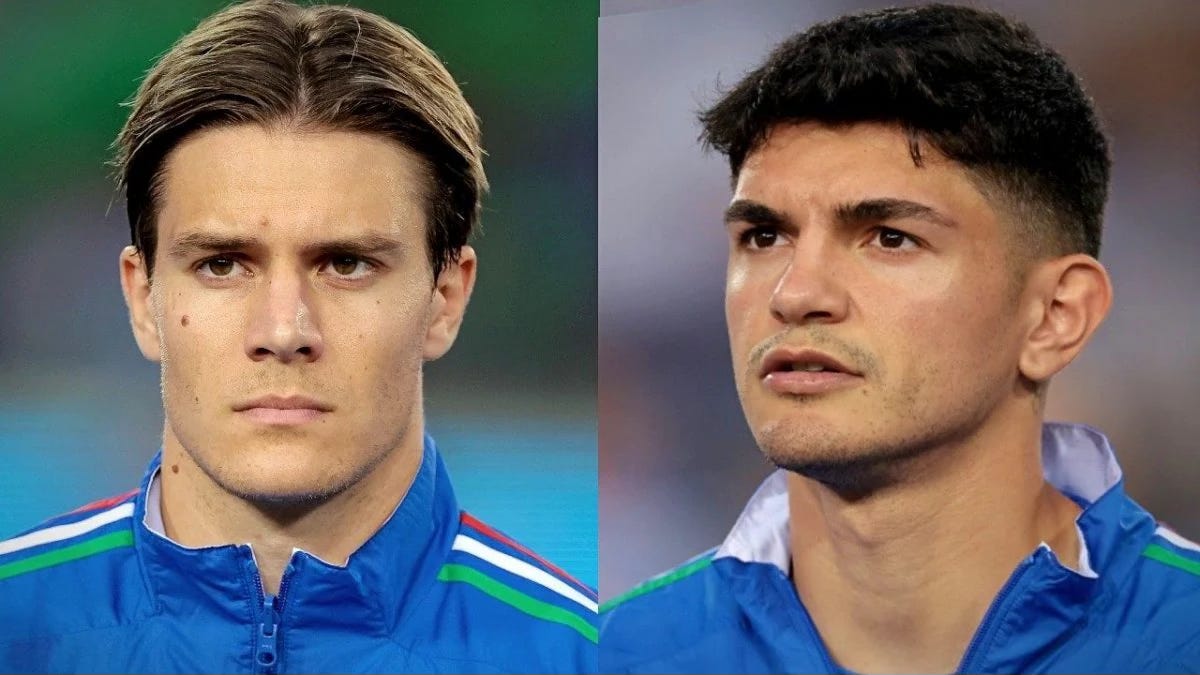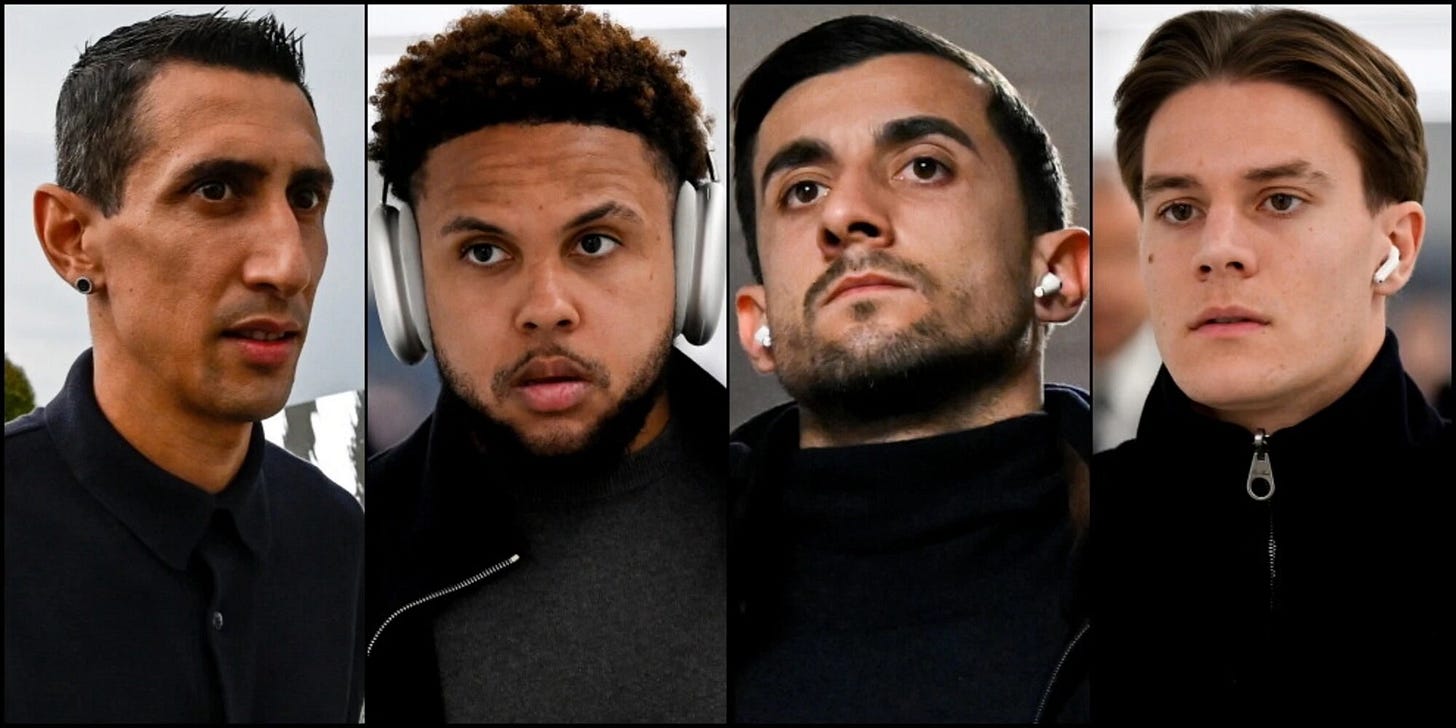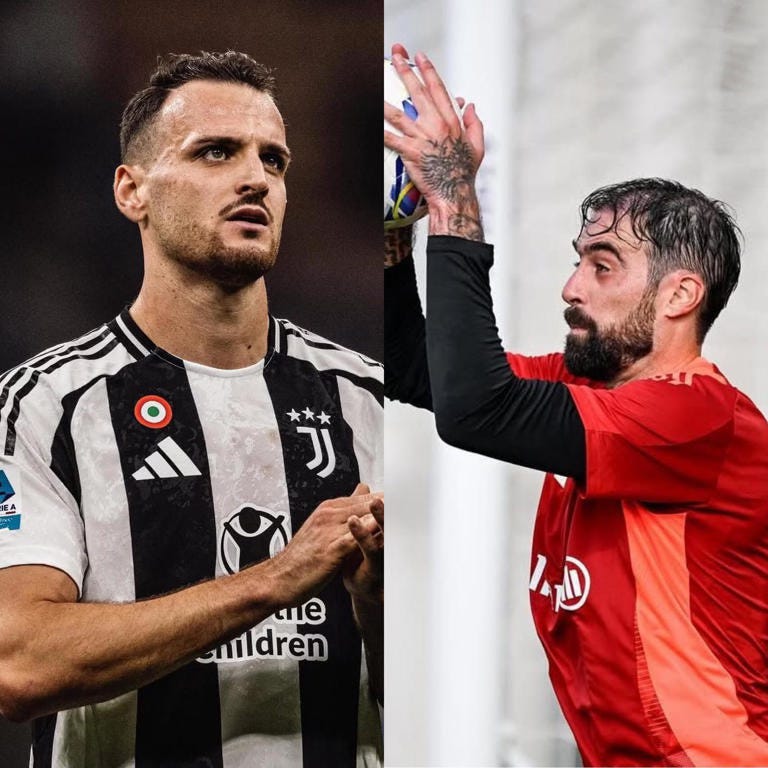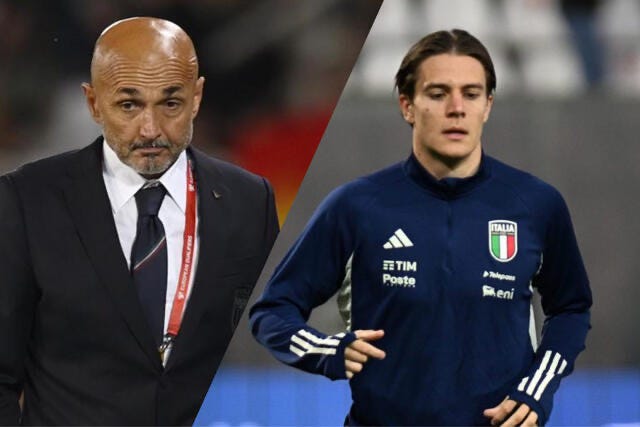Collector Fagioli for the bookmakers, seven Juventus players betting, national team players Ricci and Bellanova under investigation but the watchword is: "There are no new facts"
Italian football (media included) is now shameless: shocking facts emerge from the Turin investigation, but since it involves Juventus and the national team, everything is fine, nothing has happened
(Translated into English by Grok)
The scandal of footballers indulging, to varying degrees, in illegal betting has exploded again. Some bet on football (a very serious matter), others don’t; some even bet on their own team’s matches (an extremely serious matter), others don’t. Just 24 hours after the bombshell, the common thread uniting, blending, and standardizing mainstream media reports is immediately clear: there are no new facts compared to the evidence that emerged in the first phase of the investigation conducted by Turin prosecutors. Fagioli and Tonali, the most compromised players who, according to regulations, should have been banned for three years but were suspended by sports justice for seven and eight months respectively, have already been judged. Thus, they cannot be retried—unless new facts, unknown at the time of the sports justice ruling, were to emerge today. But everyone agrees: there are no new facts, and so the two national team players (or rather, the FIGC and coach Spalletti) can sleep soundly. Italy will head toward the 2026 World Cup with their heads held high, chests puffed out, and Fagioli, Tonali—and many others, as I’ll explain shortly—in their fighting positions. These are satisfactions.
As for the other (new) players under investigation, here too, everyone agrees: they’ve definitely made mistakes, and their behavior was reprehensible, but in criminal proceedings, they’ll get away with a fine (an oblazione) and nothing more. In sports proceedings, considering the two big offenders got off with a slap on the wrist, it’s hard to imagine anything more than a fine to teach them a lesson. In short: a lot of fear, a lot of justified and shared outrage, but in the end, let’s be honest, they’re just kids, nothing happened. Above all (“kindly requested to pass this message along to editorial offices”): nothing new has happened. That’s the watchword. Spread the word, thanks.
The situation is serious but not taken seriously, as Flaiano would say. In the little garden of Italian football, however, there’s been a change: the situation is still serious, but it’s gone from barely serious to comical. Or tragicomic, depending on your perspective. In an effort to hush everything up, sweeping the dust under the rug as always, the Istituto Luce has immediately begun broadcasting messages pleasing to the powers-that-be in a massive drumbeat: no new facts have emerged, everyone’s sorry for the unexpected resurgence of the scandal, but everything’s fine, and from tomorrow, we turn the page. Maybe. As far as I’m concerned, I’ll read the Turin investigators’ documents with great attention. From the little that has leaked so far, my impression is that there are plenty of new facts—brand-new ones, even—emerging from the prosecutors’ files.
The first is that Fagioli—and to a much lesser extent, Tonali—emerges from the completion of the investigation in a dual light: not only as the compulsive and desperate bettor already highlighted in the first part of the investigation but also as a collector of bets in the service of an illegal bookmaker. This is morally even more reprehensible behavior, severely violating Article 4, Paragraph 1 of the sporting regulations, which states that licensed individuals “must behave according to principles of loyalty, fairness, and integrity in every context related to sporting activity, both on and off the field. This principle extends beyond competitive events, encompassing any behavior.” With all due respect for a young man who has truly fallen into the vortex of gambling addiction, it now emerges that Fagioli not only bet compulsively but also worked for the bookmaker, hunting for fellow footballers to feed to him in order to secure discounts on his debts and payment extensions.
From Corriere della Sera yesterday: “On November 14, 2022, after Fagioli directed then-Roma player Nicolò Zaniolo to bet on a certain unauthorized site, De Giacomo congratulated him: ‘Well done, hook him… work for me… stay close to him, because if I land him as a solid client, I’ll obviously give you a gift.’ It’s a scheme Fagioli seemed to rely on by March 25, 2023: ‘You’ve got to load me up because I’m bringing you clients,’ and De Giacomo agreed: ‘I’ll load you up with a 5K bonus, to cover your ticket tonight since you brought me a client.’” Again from Corriere della Sera: “In a chat from that March 25, regarding then-Inter player Raoul Bellanova, Fagioli laughs about the fact that ‘you know what’s funny? I’m the one advising him’ (to bet on those sites, ed.). De Giacomo revels in Bellanova’s losses, ‘he’s taken two or three hits in a row,’ and Fagioli comments: ‘I’m laughing by myself. My cut? Will you load me up with half? You’ve got to load me up because I’m bringing you clients: I made him lose two and win one, so you owe me the difference.’”
The same approach is later agreed upon by De Giacomo and Fagioli as useful for dealing with Fagioli’s Juventus teammate, Weston McKennie.
Now, I don’t know if it’s clear to you, but to me, it is: this is the most severe form of “Stockholm Syndrome” applied to football. It’s as if a girl kidnapped and imprisoned by a cruel captor developed not only submission but affection and love for him (this can happen in cases of total psychological dependency) and offered to help him trap other girls to share her same fate. That’s exactly what Fagioli thinks and does: he lures Zaniolo, then Bellanova, then McKennie (and who knows how many others), gets them ensnared by the bookmaker, and—as with Bellanova—laughs at them, at the misfortune they’re heading toward, which he himself knowingly caused, without even realizing that Zaniolo, Bellanova, and McKennie losing money are a mirror image of himself. Fagioli laughs at Bellanova, whom he trapped and caused to lose two bets, and asks his tormentor—the bookmaker—for money to pay off the twenty bets he himself lost. He’s nothing more than a magnified Bellanova but can’t see it. He pities Bellanova, forgetting that he embodies ten Bellanovas.
Back to the point: doesn’t this seem like a new fact to you? It does to me. While I wait for your response, let me point out a second one—something you’ll never read in newspapers or websites, never hear discussed on the radio or TV, even though it’s right there in black and white in the investigators’ documents. It has emerged, not as a new fact but as a brand-new one, that not one (Fagioli) but seven Juventus players from the 2022-23 season were engaged in illegal betting. Among the 12 newly investigated are Mattia Perin (no. 2), Weston McKennie (no. 3), Angel Di Maria (no. 4), and Leandro Paredes (no. 5). Moreover, a detail everyone seems to have missed or pretended not to notice: the investigators revealed that Fagioli, in his tireless and thorough work as a collector of new clients for the betting agency, “recruited” two other Juventus players: Federico Gatti (no. 6) and Carlo Pinsoglio (no. 7). They started betting, but with a tight budget. “They’re betting a thousand euros,” De Giacomo complains to Fagioli, making it clear these aren’t the premium clients the pirate bookmaker wants.
Leaving aside the 100,000 euros reportedly spent by Vlahovic on four Rolexes at Milan’s Elysium jewelry store, which laundered money for the merry gang and about which investigators aren’t certain (it could be a loan, like many others, to help Fagioli pay part of his 693,000-euro debt), the question is: does a Serie A club with seven—yes, seven—players betting illegally seem normal to you? And above all: since, apart from Fagioli, nothing was known in the first part of the investigation that led to the sports trial about the betting of Perin, McKennie, Di Maria, Paredes, Gatti, and Pinsoglio, doesn’t this seem like a new fact to you? Doesn’t it seem like there are grounds for the Federal Prosecutor to reassess everything and request the revocation of the first trial to hold a second one, where—not only the Juventus players but all the investigated, namely Florenzi, Bellanova, Ricci, Cancellieri, Buonaiuto, and others, if new evidence emerges—would be called to account for their actions?
I might be wrong, but to me, the facts I’ve outlined seem new—facts we knew nothing about until two days ago, now sprouting like poisonous mushrooms on the lawn of Italian football. And yet, want to know how it’ll end? All this filth will amount to nothing. Because, if you haven’t noticed, with Tonali, Fagioli, and Ricci, a good chunk of Spalletti’s midfield would be gone in case of further or new suspensions. If that happened, FIGC president Gravina, the brand-saver, would have no choice but to dress up as Dr. Frankenstein and attempt a never-before-tried lab experiment: cloning Barella—who, thank God, seems uninterested in betting—and giving Spalletti three copies.
Otherwise, at the 2026 USA World Cup, we’ll see an Italy with a new name: Italy San Patrignano, essentially a recovery community (in this case, for gambling-addicted, vice-prone, or bored kids), with Fagioli, Tonali, Ricci, Bellanova, and Gatti as its backbone, with the regret that the roster only has room for 26 players. All painted as victims of the alienating modern society that ensnares and crushes them in vice, perfect subjects for documentaries like Fragile, which, for those unaware, told the story of the unfortunate, misunderstood, indeed fragile Nicolò Fagioli on Prime. “Nicolò Fagioli’s story,” Prime explains, “has a universal quality: a boy who achieves his dream, stumbles, and embarks on a journey to rise again and become a role model for all those facing tough times. Fragile tells this journey and delves into the personality of a boy whose fragility becomes a value on which to build himself and his career.”
As they say in these cases: get your tissues ready.
P.S. What are Fagioli and Zaniolo, now teammates at Fiorentina, saying to each other these days? Oh, if only we knew.





